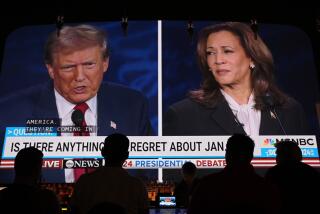Gambling’s Fall: You Can Bet on It : As Legal Games Burrow Into Our Lives, Public Will Call a Halt
- Share via
It was a lemonade stand of the ‘90s: In a suburb of San Diego, the little girl had set up her sidewalk card table with a pitcher, glasses and a box filled with numbered slips. “Cold lemonade, only $1, “ she said, adding, “buy one and get a chance to win our big prize--$25.”
The only thing missing was the sign “Void where prohibited by law.”
Oregon and Kentucky will begin taking bets on National Football League games this fall. No one in either state lottery commission sees the irony, or the danger, in basing the games on point spreads set by Nevada oddsmakers.
A third wave of legal gambling is sweeping the country. Twice before in American history, gambling was legal virtually everywhere, only to come crashing down.
The American colonies were awash in legal gambling. Lotteries were more common than today. But by the 1820s and ‘30s, well-publicized scandals and a surge of moral crusading brought lotteries into such disrepute that they were outlawed virtually everywhere.
The second wave came with the Civil War and the expansion of the Western frontier. Licensed casinos dominated the heart of Gold Rush San Francisco and tickets for the infamous Louisiana Lottery were sold in every city. Again, scandals and Victorian morality spelled the end. In 1910, New York closed its race tracks. Even Nevada outlawed all forms of gambling.
The third wave began with the Depression. In the 1930s, Nevada re-legalized casinos and 21 states opened race tracks. New Hampshire rediscovered the state lottery in 1963.
Today, 27 states have off-track betting. Mailboxes are stuffed with “You May Already Be a Winner” sweepstakes.
Gambling has come back to the stock market for the first time since the Great Crash of 1929, with similar results, when Congress overrode state laws to legalize trading in stock index futures.
Small-stakes charity bingo has grown into million-dollar Indian satellite bingo, vending machines selling pull-tabs and, in states like Maryland, three-reel slot machines. In 14 states, charities run full-scale casinos.
And then there are the state lotteries.
Lottery tickets are the only consumer products actively promoted and sold by the state. The state does not sell toothpaste, or even promote brushing your teeth. But it tells people they should gamble. The main marketing concern is how to attract new players, who otherwise wouldn’t gamble.
Lotteries were made legal because of the old argument: “People are going to gamble anyway--better for government to get the money than organized crime.” Why, then, is any form of gambling allowed to advertise, particularly one run by the state? If making money is the goal, why doesn’t the state own restaurants, or open its own brothels?
Legal gambling’s problem is that it has become too respectable. The state with the most forms of legal gambling is Iowa, not exactly a bastion of hedonism. Iowa already has a state lottery and on- and off-track betting on both dogs and horses, and has legalized, beginning in 1990, riverboat casinos with slot machines.
But the pendulum will swing back; in America, gambling eventually self-destructs.
It is difficult to predict the exact scenario of the coming boom and bust, but the short-term prediction is easy: more gambling.
Gambling begets gambling. Once the churches and states started their own games they lost the right to say that gambling is immoral. Everything became a cost/benefit analysis, and gambling makes money.
Most people buy lottery tickets only for a while. States are constantly forced to come up with more promotions and new games. Competition for the gambling dollar is fierce and players always want games that are faster and easier, with at least the illusion of player participation. Eventually we will see video poker machines and lottery terminals in every store.
The end will come when the general population says, “This is too much.” We like our gambling isolated to tourist areas like Las Vegas, not infringing on our “real” life.
The crash will be triggered by scandals, inevitable given the cash involved. State lotteries, the most heavily regulated, honest businesses in America, have already been rigged by insiders.
Sports betting will speed the fall. Think of the message that the state as bookie is giving our children: “It’s not whether you win or lose but if you beat the spread.” Other factors include gambling by children, suicides and embezzlements; simply too much hard sell. Add in a national desire to return to traditional values, and everything we see about us will once again be outlawed.
The 1990s and the first decade of the 21st Century will be the final gambling boom. By 2029 it will all be outlawed again--for a while.
More to Read
Sign up for Essential California
The most important California stories and recommendations in your inbox every morning.
You may occasionally receive promotional content from the Los Angeles Times.










